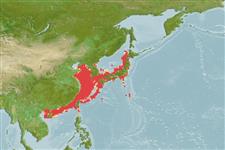分類 / Names
共通名の | 類義語 | Catalog of Fishes(部類, 種) | ITIS | CoL | WoRMS | Cloffa
>
Scombriformes (Mackerels) >
Scombridae (Mackerels, tunas, bonitos) > Scombrinae
Etymology: Scomberomorus: Latin, scomber = mackerel + Greek, moros = silly, stupid (Ref. 45335).
More on author: Cuvier.
Environment: milieu / climate zone / depth range / distribution range
生態学
海; 海洋回遊性 (Ref. 51243); 深さの範囲 0 - 200 m (Ref. 54883). Temperate; 45°N - 18°N, 108°E - 143°E (Ref. 54883)
Northwest Pacific: confined to the subtropical and temperate waters of China, the Yellow Sea and Sea of Japan north to Vladivostok, former USSR. Often confused with Scomberomorus munroi.
サイズ / 重さ / 年齢
Maturity: Lm ? range ? - ? cm
Max length : 113 cm TL オス/雌雄の選別がない; (Ref. 116934); 最大公表体重: 8.0 kg (Ref. 116934)
背面の脊椎 (合計) : 19 - 21; 背鰭 (合計) : 15 - 19; 臀鰭: 16 - 20; 脊つい: 48 - 50. Interpelvic process small and bifid. Lateral line gradually curving down toward caudal peduncle. The only species in the genus with a straight intestine. Swim bladder absent. Body covered with small scales. Anterior quarter of first dorsal fin and a narrow distal margin of the rest of the dorsal fin black. Sides with seven or more rows of longitudinal spots on the sides; some spots connected together.
Found near shore (including semi-enclosed sea areas) (Ref. 11230). Undergoes a spawning migration in spring (March to June) and a feeding migration in fall (September to November) in the Inland Sea of Japan. Feeds on small fishes. Another major fishing gear that is used are set nets. This species is the most important Scomberomorus species in Japan which is cultured and released for fishery. Marketed fresh and especially tasty in winter. Eaten pan-fried, broiled and baked (Ref. 9988).
Life cycle and mating behavior
Maturities | 繁殖 | Spawnings | Egg(s) | Fecundities | 幼生
Collette, B.B. and C.E. Nauen, 1983. FAO Species Catalogue. Vol. 2. Scombrids of the world. An annotated and illustrated catalogue of tunas, mackerels, bonitos and related species known to date. Rome: FAO. FAO Fish. Synop. 125(2):137 p. (Ref. 168)
Human uses
水産業: 高い商業の; 水産養殖: 商業; ゲームフィッシュ: はい
用具
特記事項
XMLをダウンロードして下さい
インターネットの情報源
Estimates based on models
Preferred temperature (Ref.
123201): 13 - 24.5, mean 19.2 °C (based on 181 cells).
Phylogenetic diversity index (Ref.
82804): PD
50 = 0.5000 [Uniqueness, from 0.5 = low to 2.0 = high].
Bayesian length-weight: a=0.00288 (0.00155 - 0.00538), b=3.15 (2.97 - 3.33), in cm total length, based on LWR estimates for this species & (Sub)family-body (Ref.
93245).
栄養段階 (Ref.
69278): 4.5 ±0.8 se; based on diet studies.
Generation time: 2.1 ( na - na) years. Estimated as median ln(3)/K based on 2
growth studies.
回復力 (Ref.
120179): 手段, 1.4年~4.4年の倍増期間の最小個体群 (K=0.7; Fec>100,000).
Prior r = 0.57, 95% CL = 0.37 - 0.85, Based on 1 data-limited stock assessment.
Fishing Vulnerability (Ref.
59153): Low to moderate vulnerability (34 of 100).
Climate Vulnerability (Ref.
125649): High vulnerability (58 of 100).
Nutrients (Ref.
124155): Calcium = 13.3 [4.9, 52.9] mg/100g; Iron = 0.325 [0.125, 0.917] mg/100g; Protein = 20.6 [19.1, 22.0] %; Omega3 = 0.47 [0.25, 0.94] g/100g; Selenium = 21.4 [6.2, 103.2] μg/100g; VitaminA = 8.35 [1.43, 54.86] μg/100g; Zinc = 0.31 [0.19, 0.53] mg/100g (wet weight); based on
nutrient studies.
